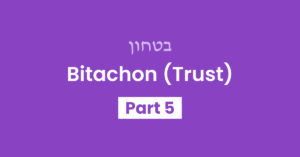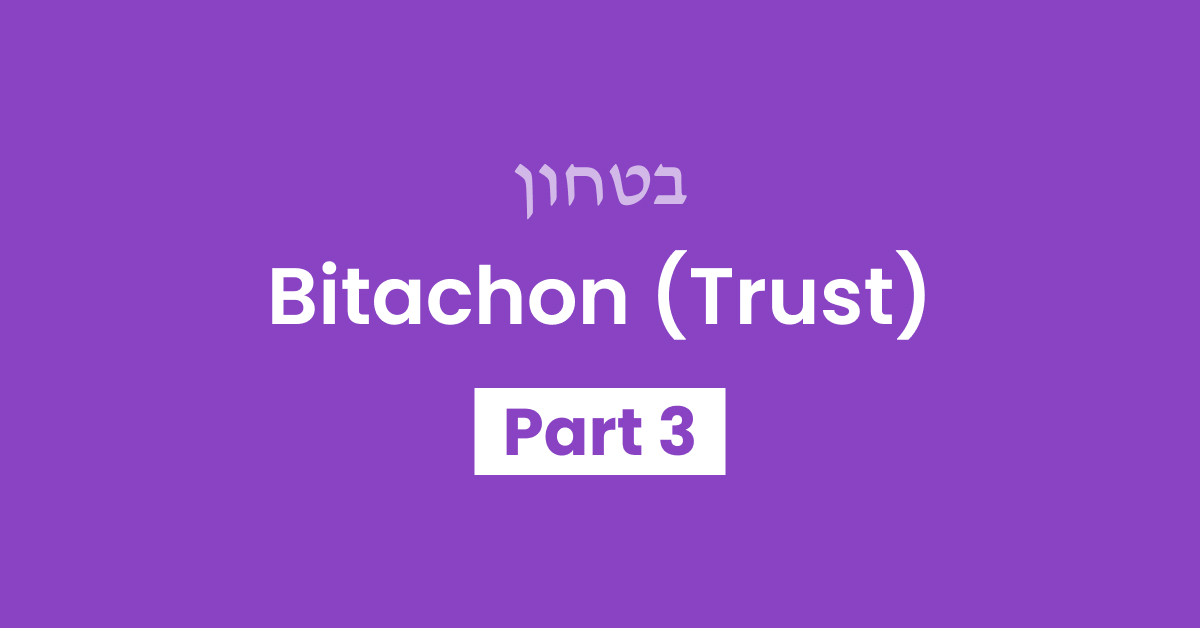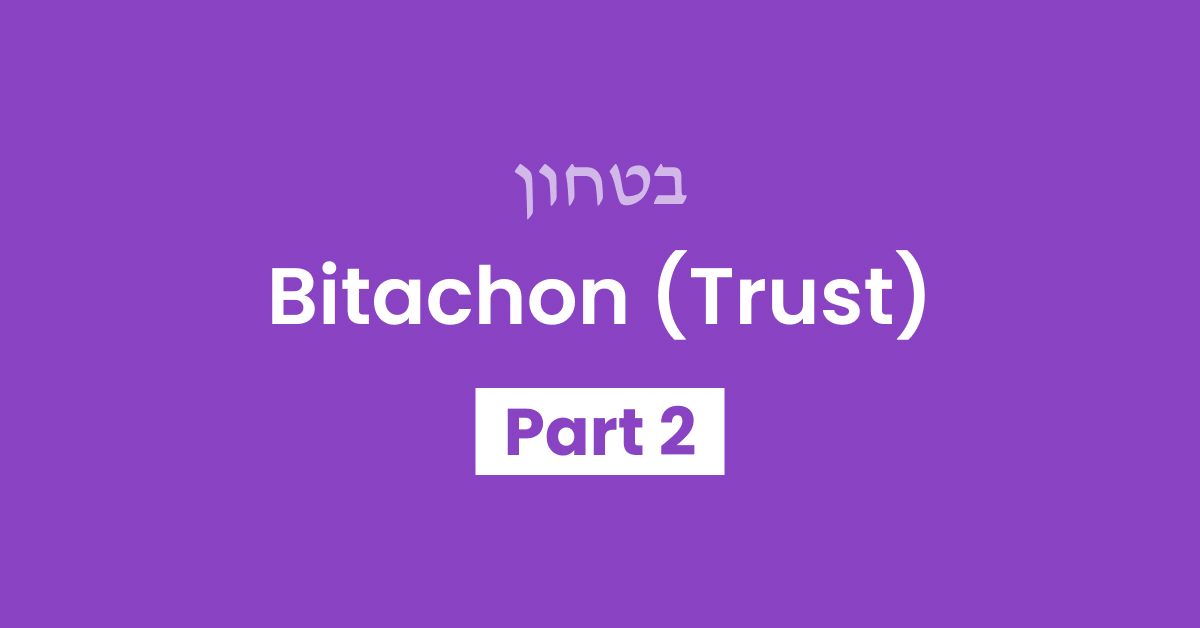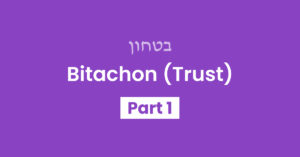So far, we have discussed how everything is in Hashem’s control, even what people do to us. We are obligated to put in hishtadlus (effort) to attain our needs, but at the same time, we must always remember that success does not come from our own efforts; rather, all successes (and failures!) come only from Hashem.
Imagine that 14-year-old Yitzy wants desperately to get accepted into a certain yeshiva. Yitzy knows that Hashem controls everything, so he davens every day that Hashem should help him get accepted. As the date of acceptance gets closer, Yitzy starts to feel very nervous. “I know you are so worried about getting accepted,” says Yitzy’s mother. “But we have to have Bitachon.”
What does it mean for Yitzy to “have bitachon”? Many people think it means that Yitzy should trust that Hashem will certainly let him get accepted into the yeshiva. But actually, the Chazon Ish1 says that’s not what “having bitachon” means.
Having Bitachon means feeling calm and reassured that Hashem can do anything, and Hashem always does whatever is best for us.2 It certainly seems to Yitzy that the best thing is for him to get accepted, but that might not necessarily be the best for him. Perhaps there is a different yeshiva that will actually be a better fit for Yitzy and help him grow much more. Having bitachon means we can rest assured that no matter what happens, Hashem will do whatever is best.
Hashem always does whatever is best for us.
It might seem like we know what’s best for us – which school I should get into, which company should hire me, which house I should buy, whom I should marry, who should be my teacher next year, or who will sit next to me in class – but the truth is that Hashem is infinitely more wise and all-knowing than we are. Only He knows what’s best.
You might think you “should” get accepted into School X, but find out later that it closed down mid-year. You might think you “should” marry Person X, but find out later they have serious issues you wouldn’t have been comfortable with. You might think you “should” catch a certain bus, but find out later that the bus broke down, so it was a good thing you weren’t on it! Or you might burn a whole pan of kugel and… well, that’s it! We don’t always get the opportunity to understand why everything that happened was for the best. But we can rest assured that Hashem always knows what He’s doing.
We don’t always get the opportunity to understand why everything that happened was for the best.
This was the message of Purim and this was also the lesson that Yosef HaTzaddik taught his brothers.
When Yosef was viceroy in Egypt and finally revealed his identity to his brothers, the brothers were terrified that Yosef would be angry because they had thrown him into the pit and sold him into slavery so many years ago. But Yosef understood that no one can hurt him unless it’s part of Hashem’s master plan, and that everything happens for a good reason. “Do not fear!” said Yosef to his brothers. “Do I play the role of G-d? You all plotted to harm me, but Hashem made it work out for the best.”3
How did it work out for the best? After Yosef was thrown into the pit, he was sold to a group of Midianites, who then sold him to Arabs, who then sold him to Egypt. While in Egypt, Yosef was taken out of jail and promoted to become a ruler, second-in-command to Pharaoh. This position of power is what made Yosef in charge of all the food in Egypt, enabling him to give food to sustain his entire family during the famine that happened years later.
Instead of being angry at his brothers for throwing him into the pit, Yosef was able to take a step back and look at the bigger picture. He saw that Hashem had manipulated his brothers’ harmful plans into something that turned out to be for everyone’s benefit!
Yosef was able to take a step back and look at the bigger picture.
The story of Yosef teaches us forever that Hashem is always running the show behind the scenes, and is making everything happen for an ultimately good purpose. Sometimes the good purpose can eventually be seen in this world, such as when Yosef was able to provide food for his family in Egypt. But other times the benefits may exist in the spiritual realm, such as when we need to experience discomfort in order to wipe away our sins, or to have the opportunity to grow from the challenge.
We are not always given the opportunity to see Hashem’s master plan in this world, but if we have bitachon then we can rest assured that everything happens for a good purpose.
Sources: [1] Chazon Ish’s Sefer Emunah U’Bitachon Chapter 2; [2] Chovos HaLevavos: Shaar HaBitachon: Chapter 1; [3] Bereishis 50:19–20
Your Challenge
When something bad happens, try to find a reason why it might serve a good purpose, and say it out loud.
It can be something that happened to you today, or something that happened to you in the past.
FOR EXAMPLE:
- “I can’t believe I’m stuck in traffic!! But you know what? Maybe it’s because Hashem wants me to spend extra time with my spouse/kids/friend in the car!”
- “Oh no! I thought we had more challah left in the freezer, but now I see we ran out! What a disappointment. Now I will have to bake more challos which will take a long time. But you know what? Maybe it’s because Hashem wants me to enjoy freshly-baked challos this week, or to get the zchus of hafrashas challah again.”
- “I am running SO late for work! But I know Hashem has a reason… Maybe I am missing an awkward moment or uncomfortable situation by coming late.”
Torah Questions
- There was once a man who cursed Dovid HaMelech and threw stones at him. What was his name? (See Shmuel II Chapter 16)
- How did Dovid HaMelech react to these curses?
- To whom was Iyov speaking when he said: “Just as we accepted the good from Hashem, shouldn’t we also accept the bad?” (Iyov 2:10)
- What was the very painful thing that Iyov was suffering from, when he said the above quote?
- When the Jews were in the desert, what miracle did Hashem do to show that He always provides every person with exactly what he or she needs – no one will ever get more or less than they are supposed to have? (Rashi on Shemos 16:17)
- The Gemara (Sotah 48b) calls certain people “Mikatnei Emunah – People of small faith.” What do these people say that demonstrates their lack of faith?
- Tehillim Chapter 125 compares someone who trusts in Hashem… to what?
- Noach had to fit so many animals into his ark that it was actually impossible for everything to fit! So Hashem made a miracle that it all fit. But if Hashem was going to do a miracle anyway, why did Noach need to make such a big ark? He could have just made a small ark, and Hashem could miraculously make it fit into that small ark! (See Ramban on Bereishis 6:19)
Questions to Ponder
- Can you remember a time in your life when you thought something was bad, but it actually turned out to be good?
- If Hashem always takes care of our needs and knows what’s best for us, why do we have to daven? Why not just say every day: “Hashem, please do whatever is best”?
- What should you do if you try to remind yourself that “everything that happens is for good” – but you just don’t feel it and can’t imagine how it could possibly be good?
- It says in Mishlei: “Trust in Hashem with all your heart, and do not rely on your understanding.” (Mishlei 3:5) Why? What’s wrong with relying on your own understanding?
- Hashem gave Mun (manna) to the Jewish people in the desert to train them in Bitachon before giving them the Torah. Why was it so important to train the Jews in Bitachon before giving them the Torah?
- The Midrash says that if someone trusts in Hashem, he will become similar to Hashem. But if someone trusts in idols, he will become similar to the idols. Why? How does that work?






